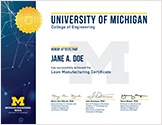FOUNDATIONS OF MOBILITY
Mobility Behavior & Technology
Home » Professional Education » Foundations of Mobility » Course I: Mobility Behavior & Technology
Key Information
Course Dates
Time Commitment
Approximately 125 self-paced hoursCOURSE I
The 15-week Mobility Behavior & Technology online course focuses on individuals’ choices within the scope of mobility. Participants explore the role of mobility in individual equity, such as health and external social influences like environmental and safety concerns.
LEARNING OBJECTIVES
Upon successful completion of this course, learners will be able to:
- Define mobility as it relates to multiple disciplines, areas of expertise, and stakeholders (mobility as an ecosystem)
- Identify challenges and successes when employing mobility concepts
- Apply mobility ecosystem concepts and techniques to solve specific mobility challenges
PROGRAM OVERVIEW
You will learn from a multidisciplinary team of experts about the topic of mobility in a variety of social, behavioral, and equity-related contexts. These include examining the influence of mobility on poverty, health, and personal well-being, as well as a discussion of mobility as it relates to health and safety (with a focus on special populations of occupants), the environment, technology, and data. An overview of safety for conventional and future vehicles is also covered, along with considerations for persons with mobility limitations. Additionally, regulatory influences within mobility are addressed, such as sustainability and behavioral economics, along with external influences like the challenges associated with the management of mobility-related data.
Course Outline
- Introduction: Course Overview
- Connecting People
- Technology and Services
- Crash Types, Engineering Anthropometry, and Computational Modeling
- Special Population of Occupants
- Future of Mobility
- Travel Demand, Energy Mobility, & Climate
- Transportation & Air Quality
- Vehicle Efficiency and Fuels
- Electric Vehicle, Air Travel, New Mobility Systems, and Sustainable Mobility
- Connected Vehicle Technology and Smart Infrastructure Technology
- Automated Vehicle
- Mobility as a Service, Virtual Tour of MCity, and Summary
- Crash Data, Geospatial Data, and Regression
- Decision Making, Data Sources, Sampling Bias and Use Cases
- You will have access to this course for 15 weeks.
- Each course module contains 7-8 hours of required recorded material and associated testing assessments.
- In its entirety, the course contains 42 hours of recorded instruction, with approximately 84 additional hours of readings, exercises, and assessments.
In addition to self-paced learning, you have the opportunity to engage with U-M faculty via email.
The course has ten quizzes, with each quiz worth 10% of the overall score. The quizzes consist of multiple-choice questions based on lecture concepts and are administered via Canvas. Learners may attempt each quiz up to two times with the highest score retained. If additional attempts are needed, please contact [email protected]. Successful completion of all quizzes with an 80% pass rate overall is required to earn a digital badge for this course.
- Successful completion of all course modules, readings, and testing assessments with an 80% pass rate is required to earn a digital badge for this course.
- To earn a Certificate in Foundations of Mobility, successful completion of this course and Course II: Mobility Systems Design, Finance, and Regulation is required.
Working knowledge of high school math (algebra) is expected.
Administrative/Online Technical Support
Support staff are available via phone and email to help with administrative and technical issues during our normal business hours (Monday through Friday 8:00 a.m. to 5:00 p.m. Eastern Time). Contact us at [email protected].
Content Questions and Support
Candidates are welcome to contact the course instructors and/or their course assistants with content-related questions and support.
INSTRUCTIONAL TEAM


Carol Flannagan, PhD
- Research Professor, CMISST, U-M Transportation Research Institute (UMTRI)

Robert Hampshire, PhD
- Associate Professor of Public Policy (on leave as Chief Science Officer, U.S. Department of Transportation)

Monica Jones, PhD
- Associate Research Scientist, Biosciences, U-M Transportation Research Institute (UMTRI)

Henry Liu, PhD
- Director of Mcity and CCAT
- Research Professor, U-M Transportation Research Institute (UMTRI)
- Professor, Civil and Environmental Engineering


